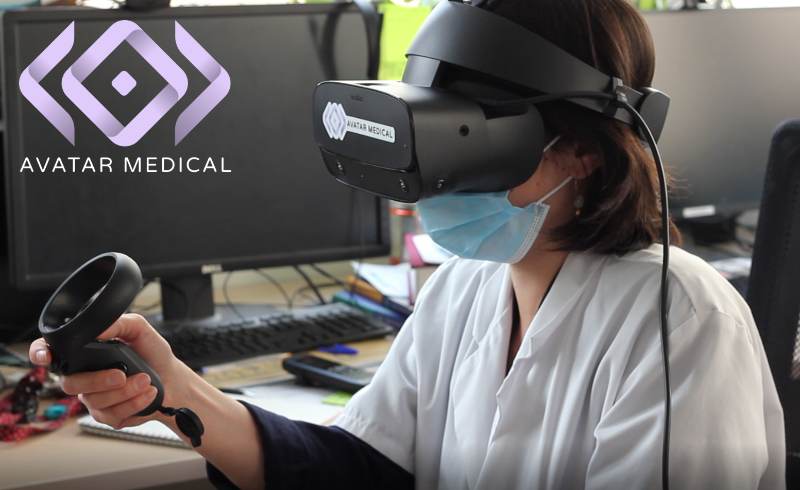Recent advancements in medical imaging technology have been transforming healthcare. Sector developments are resulting in imaging that is clearer, more precise, and easier to interpret. This leads to more accurate disease diagnoses, targeted medical treatments, and improved patient care.
Franco-American startup Avatar Medical is among the wave of new medical imaging startups impacting the healthcare sector. The company raised a €5 million Seed Round earlier this year for its Extended Reality imaging tech, which it believes will be a game changer for patients, hospitals, surgeons, and medical students.
“Our tech has four main applications: Patient engagement, surgical planning, training, and research,” said Avatar Medical CEO and Co-Founder Xavier Wartelle. “We originally developed Avatar Medical as a tool to help surgeons better understand the black and white images they are looking at, but what we actually discovered is that a major benefit is actually for the patient."

What is Avatar Medical?
Stemming from 4 years of research at renowned French research institutions, Institut Pasteur (microbiology, disease, and vaccines) and Institut Curie (cancer research and treatment), Avatar Medical is an Extended Reality (XR) MedTech startup whose platform transforms medical images into patient-specific 3D “avatars”.
Avatar Medical's over-the-top immersive software allows users, doctors, surgeons, and patients, to visualize traditional medical images (MRI, CT scans etc.) in 3D on a screen or using a virtual reality headset. Users open the application on a computer, access a patient file from the PACS, the hospital's medical image database, and within seconds, a 3D rendering is displayed on the flat screen and in the virtual reality headset.
Why?
Wartelle said Avatar's technology can address three challenges facing the healthcare industry:
- Patient engagement
According to Wartelle, patients grappling with complex medical diagnoses like cancer or spinal issues, often feel overwhelmed during consultations with surgeons. Traditional methods of explanation using indecipherable black-and-white images, leave them feeling confused and anxious. For Wartelle, Avatar Medical’s solution allows patients to clearly see and understand what is happening inside their bodies. This not only empowers them with knowledge but also improves communication and trust between the surgeon and patient.
“Ultimately, the integration of avatars leads to clearer consultations, greater patient engagement, and probably better treatment outcomes," he said.
"In the case of chemotherapy treatment, for example, patients can see their cancers shrinking. This is very important for morale and reinforcing adherence to the treatment."
- Surgical planning
3D Imaging plays a crucial role when it comes to surgery. Designed with the help of Professor Fabien Reyal, Head of the Department of Gynecological, Breast, and Reconstructive Surgery at the Institut Curie, Avatar Medical's first use case was to produce 3D images of breast cancers for the junior surgeons in the professors’ team.
Wartelle said that a study conducted by the company found that 15% of vascular surgeons would have reviewed their initial surgical decisions after viewing the patient’s aneurysms in 3D imagery.
“Correctly determining the size, location, and spread of a breast cancer tumor is both complicated and very high stakes, as it will determine whether the cancer requires a lumpectomy or a mastectomy,” explained Wartelle. “Clear, reliable imaging showing crisp anatomical detail with bone, glands, vessels, muscles, and nerves enables surgeons to make better decisions and improves their spatial awareness during surgery, therefore, reducing errors during surgery."
- Medical training and research
Avatar Medical has begun partnering with companies like the French startup Uptale to provide complete training solutions for medical students using Avatar Medical images and content to create online Q&As. The training programs are underway in universities like the Sorbonne, Bescançon, University of Aberdeen, and the City University in New York. “Virtual Reality is a very powerful tool for training," Wartelle said. "It offers a more impactful experience, so you better memorize what you see. It's far more engaging.”
On the research front, Avatar Medical claims to be pushing the boundaries of the application of Extended and Virtual Reality tools in the medical field, partnering with clinics and hospitals like the Institut Curie and CHU Martinique on real-life use-cases in different pathologies and publishing its research in medical journals.
Under the hood

Developed using a video game engine, Avatar Medical’s software can be applied immediately to a wide range of medical images.
“It currently has over 20 relevant clinical applications,” said Wartelle.
The software contains a "one-click filter” which allows the user to select a particular anatomical element of interest within the different radiological slices. A statistical analysis is conducted on this area, and a filter is applied to highlight it. Measurements can also be shown on the screen and the result is immediately usable.
To ensure that their software is compatible with all main VR headsets available on the market, the company has partnered with tech giants HTC and Meta.
Avatar Medical is not the only startup in the 3D imaging field but according to Wartelle, their tech is the most efficient. “There are competitor softwares but they are unable to show the level of detail that Avatar can," he said. "They simplify the images by only showing detected surfaces of organs, everything else is then removed. This means that in vascular surgery, for example, you would risk not seeing small arteries, or misevaluating the boundaries of a tumor.”
He added: “With competitor solutions, the images must be sent and treated outside of the hospital which is both time-consuming and risky. With Avatar Medical’s software, you access the image directly from the hospital’s database.”
Who?
Avatar Medical was founded in 2020 by a 5 person team of French and American entrepreneurs, physicists, engineers, and surgeons.
Wartelle has built a reputation as a serial entrepreneur and a serial innovator. Throughout his 35-year career, spanning North America and France, corporations, and startups, he has launched 7 startups across a range of industries (Telecoms, e-commerce, SaaS…) and sold four of them.
Since relocating to San Francisco in 1995, Wartelle built an accelerator in the Dogpatch area called Hubtech21 that was dedicated to supporting expatriate French founders and their startups. This same accelerator later became the world’s first French Tech Hub which he launched in 2014 alongside Fleur Pellerin the then Deputy Minister in charge of SMEs, Innovation, and Digital Economy.
While back Paris in 2019, Wartelle was looking for a new Deep Tech project to pilot and met Dr. Elodie Brient-Litzler, one of Avatar Medical’s five co-founders and COO. A French engineer and biochemist with 15 years of experience in MedTech innovation and startup initiation, she is also Head of Innovation Development, Technologies for Life Sciences, and Med-tech at France’s Institut Pasteur. Her role consisted of helping scientists get their inventions to the stage where they can be introduced to the medical industry as a startup or company.
At the time, she was working with Dr. Mohamed El Beheiry, now Avatar's CTO, a French-Canadian engineer and physicist with over 15 years of experience in scientific software development and data visualization; and Dr. Jean-Baptiste Masson, (CSO) a research scientist in Physics, Statistics, and Biology and a Lab Director at Institut Pasteur.
The 5th co-founder is Marie Buhot-Launay, (CRO), a former VP of sales for a large online training platform and co-founder with Wartelle of “The Big Bang Factory,” a service provider for growing businesses.
“Elodie had been working on a new technology project led by Jean-Baptiste and Mohamed at the institute that they wanted to develop into a tech startup and she was looking for a CEO with whom to do so," Wartelle said. "We hit it off, bringing our respective colleagues into the founding team and Avatar Medical was launched at the very beginning of 2020."
The Full Scoop...
Subscribe to get Avatar Medical's funding details, a breakdown of its investors, and its roadmap to raising a Series A round.









